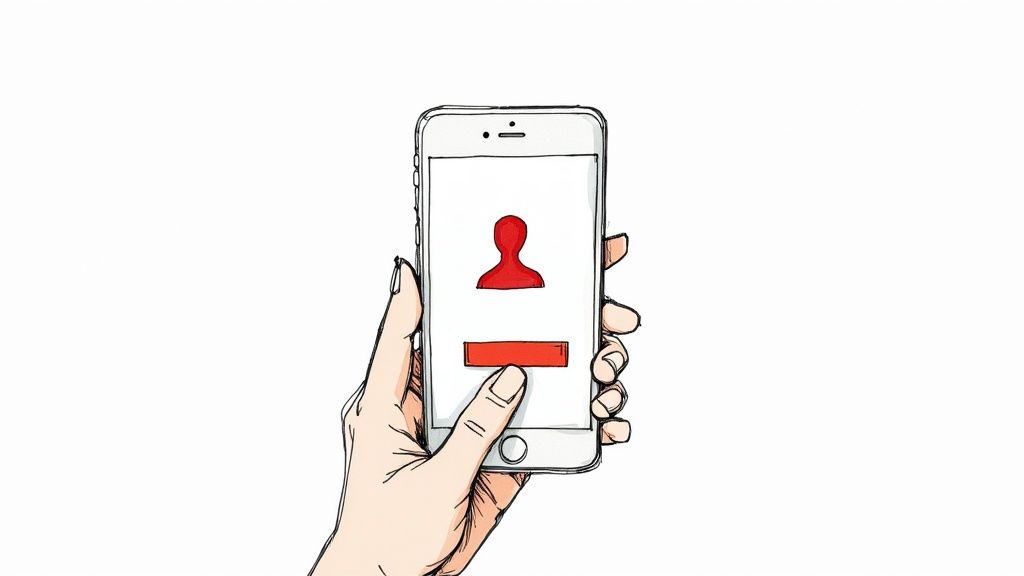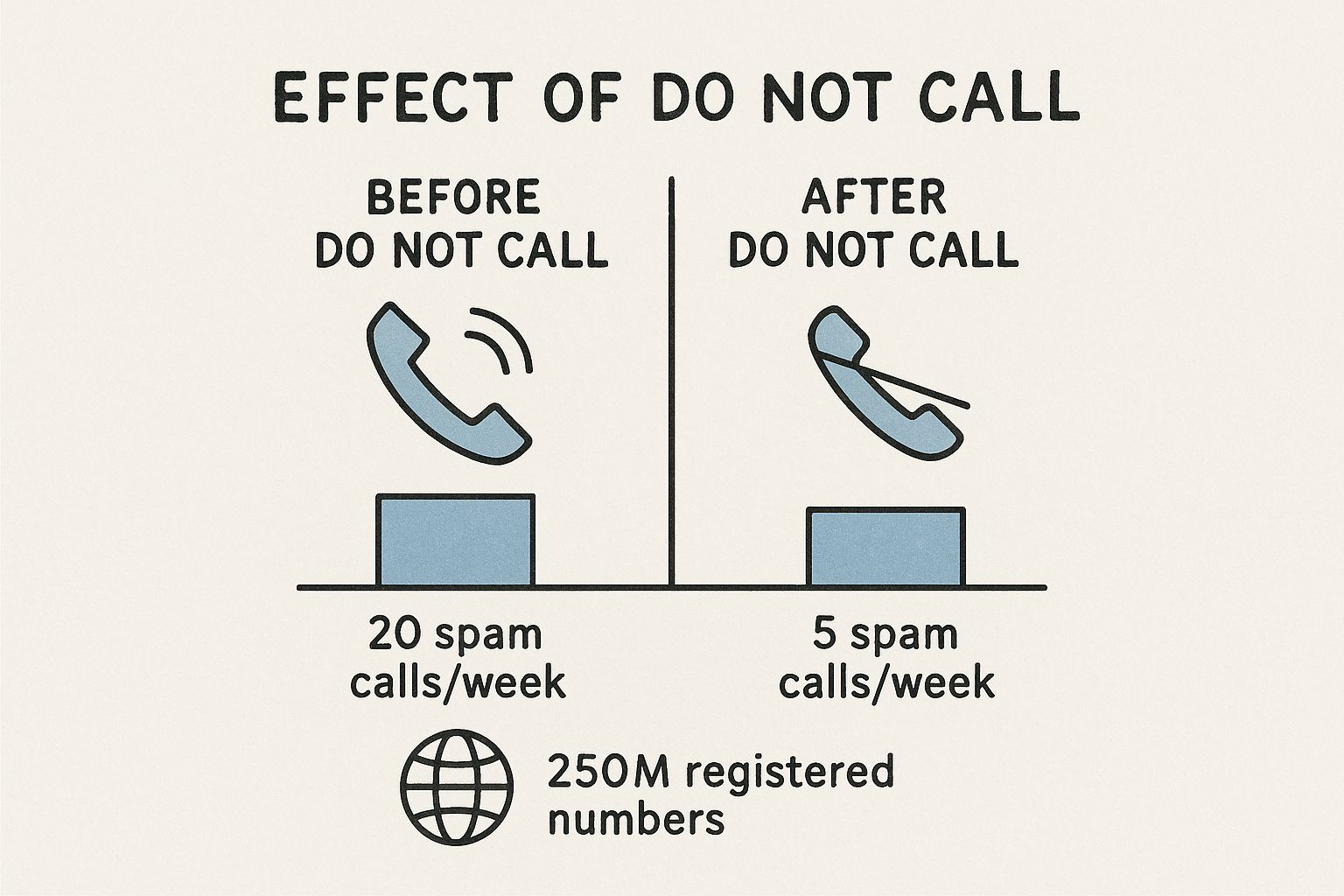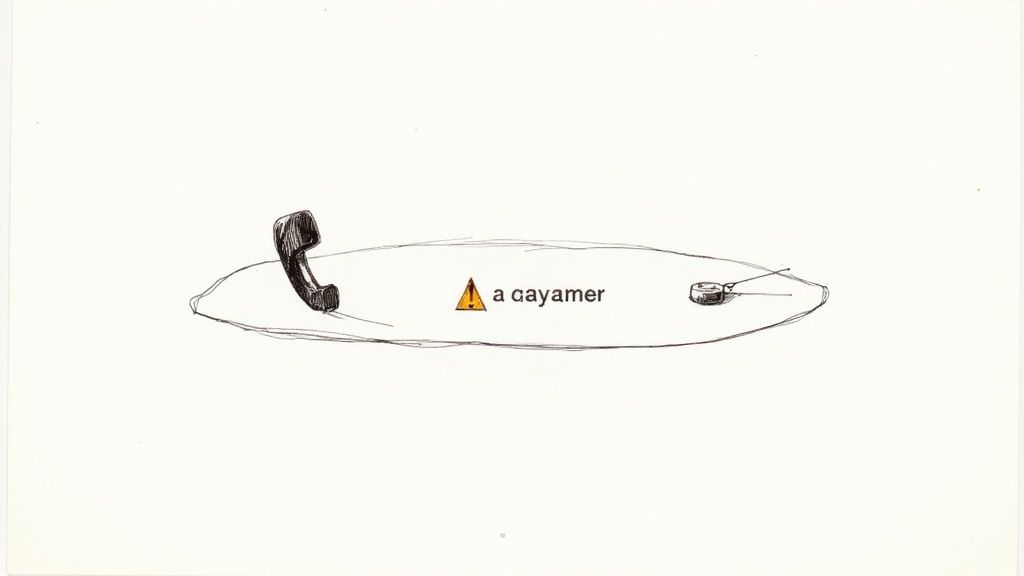You can absolutely get a handle on spam calls. It takes a mix of using your phone's own features like Silence Unknown Callers, getting your carrier involved, trying out some specialized apps, and even adding your number to the National Do Not Call Registry. A layered approach is always the best defense against robocalls and potential scams.
Why Is My Phone Blowing Up with Spam Calls?
That constant, nagging buzz from an unknown number isn't just you. It’s a frustratingly universal experience these days, and it's not simply bad luck. There's a massive, automated industry working overtime to get your attention.
To really shut them down, it helps to first understand how they operate.
Your phone number is a hot commodity. It often ends up in the wrong hands through big data breaches where hackers swipe customer lists from companies you’ve dealt with. Other times, it's scraped from public records or even your social media profiles.
The Playbook Spammers Are Using
Spammers aren’t sitting there dialing numbers one by one. They're using some pretty sophisticated tech to hit as many people as possible and slip past basic defenses.
- Automated Dialers (Robocalls): Think of these as machines that can dial thousands of numbers a minute. If you answer, they play a prerecorded message. It’s a pure numbers game for them—they only need a tiny fraction of people to respond.
- Number Spoofing: This is a sneaky one. Spammers will disguise their real number, often making it look like it's coming from your area code. It's a simple trick, but it dramatically increases the chance you'll answer a seemingly familiar number.
- Interactive Voice Response (IVR): More advanced spammers use voice prompts ("Press 1 to speak to a representative") to figure out if they've reached a real person or just voicemail. This makes their operation much more efficient. (Legitimate businesses use similar systems, too, which you can read about in our guide on what is an answering service.)
This isn't just about annoying calls, either. It’s a piece of a much larger puzzle of digital risks we all face. For perspective, an estimated 3.4 billion phishing emails are sent every single day, making it one of the most pervasive cyber threats out there. Spam calls operate on the exact same principles of high volume and deception. You can find more eye-opening phishing statistics here.
The heart of the problem is that technology has made it incredibly cheap and easy for spammers to place millions of calls. They only need a tiny success rate to turn a profit, which is precisely why the calls just keep coming.
Know Your Enemy: Different Types of Spam
Not all unwanted calls are created equal. Knowing what you're dealing with helps you pick the right defense.
Legitimate telemarketers, as persistent as they can be, are legally required to stop calling if you ask them to.
On the other hand, illegal robocalls and outright scams—the ones pretending to be the IRS or your bank—are designed for one thing: to defraud you. By spotting the type of call, you can arm yourself with the right tools, which we’ll get into next.
Use Your Phone’s Built-In Spam Blocking Tools
Before you even think about downloading a third-party app, your first line of defense against spam calls is already in your pocket. Seriously. Your smartphone comes packed with powerful, free tools designed to shut down the daily flood of junk calls, and they are surprisingly effective.
Activating these native features is the simplest, quickest step you can take. Think of them as a digital bouncer for your phone, stopping suspicious callers before they ever get a chance to ring.
Silencing Unknown Callers on Your iPhone
If you’re an iPhone user, the feature you’re looking for is called Silence Unknown Callers. It’s a game-changer. When you flip this switch, any call from a number that isn't in your contacts, recent outgoing calls, or Siri Suggestions goes straight to voicemail. Your phone won't even buzz.
Turning it on is incredibly easy.
- Open the Settings app.
- Scroll down and tap on Phone.
- Find and select Silence Unknown Callers.
- Toggle the switch on. That’s it.
Here’s exactly what that final screen looks like, so you know you’re in the right place.

Once this is active, only numbers you actually recognize will make your phone ring. The immediate peace and quiet are a massive relief.
Enabling Android’s Caller ID and Spam Protection
Android phones, especially those running Google's Phone app, have their own powerful tool: Caller ID & Spam Protection. It’s usually on by default, but it’s always a good idea to double-check.
This feature uses Google’s enormous database to identify potential spammers, often slapping a big red "Spam" warning on your incoming call screen. You can also set it to automatically block these calls so they never bother you.
Here’s how to check your settings:
- Open your Phone app.
- Tap the three-dot menu icon and head into Settings.
- Look for an option like Caller ID & spam.
- Make sure both "See caller & spam ID" and "Filter spam calls" are enabled.
With this active, Google does the heavy lifting, filtering out known junk callers before your phone ever rings.
The Real-World Trade-Off and How to Manage It
Now, these built-in tools are fantastic, but they’re not flawless. There’s one big catch: you might miss a legitimate call from an unknown number. We’ve all been there—waiting on a call from a delivery driver who can't find your place, the doctor's office with test results, or even a new client trying to get in touch.
These calls would be sent directly to voicemail. The key isn't to avoid using these powerful tools but to build a new habit around them.
So, how do you manage this? You just need to be a bit more proactive. Get into the habit of checking your voicemail and "Recent Calls" list once a day. If you know you're expecting a critical call from an unknown number, you can always toggle the feature off temporarily.
For a more advanced setup, you could look into diverting calls to another number to create a system that catches important calls without letting the spam through. It's all about finding a balance that lets you enjoy the silence without feeling disconnected.
Activating Your Mobile Carrier's Spam Protection
While your phone’s built-in tools are a solid first line of defense, your mobile carrier offers a different, more powerful layer of protection. Think of it as a gatekeeper at the network level, capable of spotting and shutting down suspicious calls before they even have a chance to ring your device.
All the major US carriers—Verizon, T-Mobile, and AT&T—provide these services, and the best part is, they usually have a pretty robust free tier.
These systems work by analyzing massive amounts of call data across their entire network, not just on your individual phone. They can spot patterns that would be invisible to you, like one number making thousands of calls a minute—a dead giveaway of a robocall operation. It’s an essential part of any good strategy for blocking spam.
What Your Carrier Offers For Free
Most carriers automatically enroll you in a basic spam-blocking service without you having to lift a finger. These free plans are designed to catch the most obvious and high-volume scam campaigns.
- T-Mobile’s Scam Shield: This is T-Mobile's answer to spam. It identifies likely scam calls and gives you the choice to block them automatically. It also throws in a handy enhanced caller ID for many numbers that aren't already in your contacts.
- AT&T Call Protect: If you're with AT&T, their free tool automatically blocks calls flagged as fraudulent. For others that seem fishy but aren't confirmed scams, it'll give you a warning right on the call screen.
- Verizon Call Filter: The free version of Verizon's service detects and filters out spam calls. It also lets you report junk numbers, which helps make their system smarter for everyone on the network.
Even these basic, free tools are a huge step up from doing nothing.
The real power of carrier-level protection is that it's proactive. It doesn't wait for a spammer to annoy you; it tries to stop the call from ever connecting in the first place, saving you from the interruption entirely.
Just taking one simple step can make a massive difference. Look at how registering on the Do Not Call list can slash the number of junk calls you get each week.

The data is clear: being proactive dramatically cuts down on the noise, letting you use your phone for what it was made for—actual communication.
To make it easier to see what's on offer, here’s a quick rundown of the major US carrier services.
Major US Carrier Spam Blocking Services Compared
| Carrier | Service Name | Key Free Features | Premium Features (and Cost) |
|---|---|---|---|
| Verizon | Call Filter | Spam detection, spam filter, and a personal block list for up to 5 numbers. | Call Filter Plus ($3.99/mo per line): Caller Name ID, spam lookup, personal block list for up to 10 numbers, and a spam risk meter. |
| T-Mobile | Scam Shield | Scam ID, scam block, enhanced Caller ID, and a free proxy number through T-Mobile DIGITS. | Scam Shield Premium ($4/mo per line): Manages block lists, sends specific call categories to voicemail, reverse number lookup. |
| AT&T | Call Protect | Automatic fraud blocking, suspected spam warnings, and manual call blocking. | Call Protect Plus ($3.99/mo per line): Enhanced Caller ID with name/location, reverse number lookup, and custom call controls. |
Note: Pricing and features are subject to change. Always check with your carrier for the latest details.
As you can see, the premium options add more granular control for a few bucks a month.
When to Consider a Paid Upgrade
So, when is it worth shelling out a few extra dollars? It really boils down to how much spam is still getting through and disrupting your day. If the free tools are doing a decent job but you're still getting hammered, an upgrade might be a small price to pay for some peace and quiet.
The paid tiers usually give you more advanced controls. You’ll often find features like a much larger personal blocklist, more detailed caller ID with names and locations, and the power to block entire categories of calls, like all telemarketers or political solicitations.
Blocking spam is a constant cat-and-mouse game. It involves technology, legal frameworks like the STIR/SHAKEN protocol (which helps verify caller ID), and your own vigilance. Unfortunately, determined spammers always find new ways to slip through the cracks.
In fact, a shocking 90% of spam calls Americans receive appear to come from US numbers, making them harder to spot and ignore. You can explore more US spam call statistics to get a better sense of just how big this problem is.
My advice? Start with the free service your carrier provides. See how well it works for a few weeks. If you still find yourself fielding too many junk calls, then it’s time to consider whether a premium upgrade is worth it for you.
Time to Bring in the Specialists: Advanced Third-Party Spam Blocking Apps
So, you’ve tried the built-in tools on your phone. You’ve even activated your carrier’s spam protection. But the robocalls still won’t stop.
When the basic defenses just aren't cutting it, it's time to call in the specialists. Dedicated third-party spam blocking apps offer a much more powerful and aggressive line of defense, often using technology that goes way beyond a simple blocklist.
Think of these apps as a highly intelligent, full-time security guard for your phone. Instead of just checking a small list of known offenders, they tap into massive global databases of spam and scam numbers—databases that are updated constantly. This gives them a huge leg up in identifying and shutting down annoying calls with far greater accuracy.

How These Advanced Apps Actually Work
The real magic behind popular apps like Nomorobo, Truecaller, and Hiya lies in their community-powered, crowdsourced approach. It’s a brilliant defense system that adapts in near real-time.
Every time a user somewhere in the world reports a new spam number, that information is used to protect everyone else on the network. It’s this collective intelligence that makes them so effective against ever-changing scammer tactics.
And the scale of the problem is staggering. In the first quarter of 2025 alone, monitoring services flagged an estimated 12.5 billion suspected spam calls worldwide. That breaks down to an incredible 137 million unwanted calls every single day. Those numbers make it pretty clear why a dynamic, database-driven approach is essential. You can get the full picture by checking out the latest global call threat findings.
Many of these top-tier apps also pack in features that go beyond basic blocking:
- Smarter Caller ID: They often identify the name or business behind an unknown number, giving you the context you need to decide whether to pick up.
- Live Call Screening: Some services will actually answer the call for you, asking the caller to state their purpose before the call is ever passed along to you.
- Reverse Number Lookup: This lets you punch in a number to see who it belongs to and check for any spam reports from other users in the community.
For a business owner, these tools can be a game-changer. You can’t afford to miss a potential new client, but you’re drowning in junk calls. An intelligent screening feature can act like an automated answering service, making sure real opportunities get through while filtering out all the noise.
The Big Question: What About Your Privacy?
This advanced protection does come with an important trade-off: privacy. For these apps to work their magic, they often need significant permissions. We're talking access to your contacts and your call history.
They need your contact list to know which numbers not to block—a process known as whitelisting. Without it, the app might accidentally block a call from your doctor or a family member.
Granting this access means you are trusting the app developer with your personal data. It's crucial to read the privacy policy of any app you consider and understand exactly how your information will be used and protected.
Ultimately, this is a personal call. You have to weigh the powerful spam protection against your comfort level with sharing your data. For many people, the peace and quiet gained from a silent phone is a worthy exchange. If you’re on the fence, start by researching apps with strong, transparent privacy policies before you commit.
Smarter Call Screening with AI-Powered Assistants
When the usual blocklists and carrier filters just aren't cutting it anymore, it's time to look at the next frontier in stopping spam calls: artificial intelligence. The problem with static lists is that scammers are always one step ahead, constantly cycling through new numbers. AI-powered assistants, on the other hand, bring a dynamic, real-time defense to the table that learns and adapts on the fly.
Instead of just checking a number against a database of known offenders, these intelligent systems analyze calls the moment they come in. They’re looking for suspicious patterns, like weird connection types or behaviors common to robocalling systems, and can actually screen the caller before your phone even rings. It’s a huge leap from simply blocking numbers to intelligently managing who gets to interrupt your day.
How AI Elevates Call Protection
Think of an AI assistant as your own personal gatekeeper, making smart decisions about which calls are actually worth your time. This technology is becoming more mainstream, and for businesses, looking into an AI voice phone assistant for restaurants can shed some light on the incredible potential of automated call handling. The real magic is in its adaptability—as spammers change their tactics, the AI learns and beefs up its defenses.
This gives you a few massive advantages:
- Real-Time Analysis: AI isn't working off yesterday's news. It sizes up every single call's characteristics the second it tries to connect.
- Intelligent Screening: The assistant can interact with the caller to figure out what they want, neatly separating a real customer from an automated dialer.
- Fewer Interruptions: By fielding that initial contact, the AI ensures only verified, important calls actually get through to you, letting you stay focused.
For a business owner, an AI phone answering system is about more than just dodging spam—it’s about making sure you capture real opportunities that might have been buried in all the noise.
By bringing AI into the mix, you're shifting from a reactive game of whack-a-mole to a proactive strategy for managing all your communications. It’s a smarter, more modern way to make sure you never miss a critical call while keeping the junk out for good.
Common Questions About Blocking Spam Calls
Even after you've set up a few layers of defense, some questions inevitably pop up. Getting your spam-blocking strategy just right means understanding the details and potential trade-offs of each method. Let's clear up some of the most common ones.

Will I Miss Important Calls if I Block Unknown Numbers?
This is the biggest—and most valid—concern I hear. When you use a feature like the iPhone's "Silence Unknown Callers," any number not saved in your contacts gets sent straight to voicemail. It’s incredibly effective against spam, but it could also catch a legitimate call from a delivery driver, your doctor's office, or a new business lead.
The risk is real, but it’s definitely manageable. All it takes is building a simple new habit: check your voicemail and "Recent Calls" list once a day. If you know you're waiting on a call from an unknown number, you can always turn the feature off temporarily. Better yet, try to get their number ahead of time and add it to your contacts.
It's all about finding that sweet spot between reclaiming your peace and staying accessible. A daily check-in gives you the best of both worlds—a quiet phone without the fear of missed opportunities.
This small adjustment lets you enjoy powerful spam filtering without feeling cut off from the calls that actually matter.
Are Paid Spam Blocking Services Actually Worth the Money?
Honestly, it depends on how bad your spam problem is. If you’ve tried the free tools on your phone and from your carrier but are still getting swamped, then yes—a premium service is often a worthwhile investment for your sanity.
Paid apps usually justify their cost by offering more firepower:
- More Advanced Caller ID: They can often identify the names of businesses and people who aren't in your contacts.
- Smarter Blocking: These apps let you automatically block entire categories of nuisance calls, like political surveys or generic telemarketers.
- Faster Database Updates: They tap into huge, community-fed databases, which means they can protect you from new scam numbers much faster than the built-in options.
My advice? Start with the free stuff first. If the interruptions keep derailing your day or costing your business, upgrading to a paid service can deliver the aggressive protection you need. For more specific questions, you can always check out a detailed FAQ about call management.
How Can I Report Spam and Scam Calls?
Reporting these calls helps everyone in the long run. In the U.S., the best place to file a complaint is with the Federal Trade Commission (FTC) at DoNotCall.gov.
Now, this won't magically stop that specific number from calling you again tomorrow. But it serves a much bigger purpose. Your report gets fed into a massive database that law enforcement agencies use to spot patterns, track down illegal call centers, and build cases against scammers. Every report you file is a small contribution to the broader fight and helps protect others from getting scammed.

